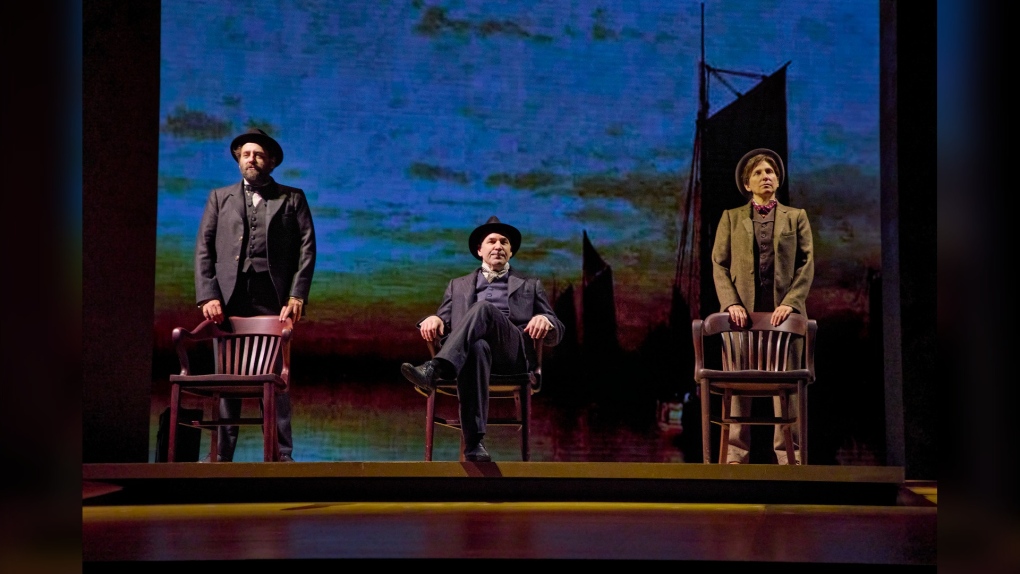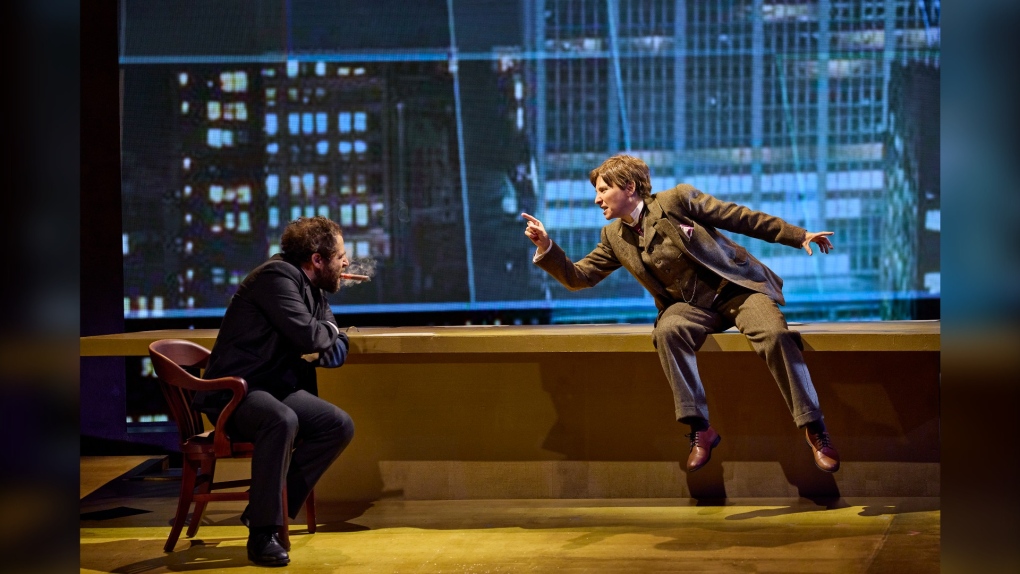The Lehman Trilogy explores one family's rise from immigrants to investment banking billionaires to out of luck
 Michael Rubenfeld, Alex Poch-Goldin, Diane Flacks in The Lehman Trilogy. Photo: Trudie Lee.
Michael Rubenfeld, Alex Poch-Goldin, Diane Flacks in The Lehman Trilogy. Photo: Trudie Lee.
What could be more timely than an epic, award-winning (Five Tonys) American drama about money problems?
Well, for one thing, no one will ever confuse the Lehman boys with Willy Loman, the hero of Arthur Miller’s Death of a Salesman, the 1949 award-winning (Pulitzer, Tony) American drama about money problems.
In the latter, Willy was a victim of American business culture, someone who built his fragile dream on a reality that wasn’t really there.
In the case of The Lehman Trilogy, which opened last week at Theatre Calgary, American business culture is both the hero and the villain of a three-hour drama where almost everything goes right for the Lehmans – until it doesn’t, a century and a half after their arrival at Ellis Island in New York as Jewish immigrants from Bavaria.
I feel as if I just sat through the world’s longest TED Talk! And rather than sending the audience at the Max Bell Theatre out into the night on a note of inspirational uplift, the whole multi-billion dollar enterprise that the brilliant Bavarian émigré Lehmans build over a century and a half ends up vanishing in the teeth of the 2008 economic crash.
What is also kind of shocking is that for a three-hour long TED Talk, The Lehman Trilogy is also thoughtful, entertaining and moving.
The story within the story of The Lehman Trilogy is that the whole century and a half long saga is performed by three actors, who do everything except serve drinks to the audience at intermission.
 Michael Rubenfeld, Alex Poch-Goldin, Diane Flacks in The Lehman Trilogy at Theatre Calgary through November 3. Photo: Trudie Lee
Michael Rubenfeld, Alex Poch-Goldin, Diane Flacks in The Lehman Trilogy at Theatre Calgary through November 3. Photo: Trudie Lee
The patriarch, Henry Lehman (Michael Rubenfeld), a fabric salesman, is the origin story who we meet in a humble shop in Montgomery, Alabama in the late 1850s where he has opened a small shop with a single sign advertising fine fabrics and suits.
However, before long, Henry has the epiphany that he needs to expand the line to meet the needs of the locals, many of whom happen to be cotton plantation owners – and before long, Henry, with the assistance of his siblings Emmanuel (Alex Poch-Goldin) and Mayer (Diane Flacks), is selling seeds, and tools and boots and straw hats too.
And then, not long after that, just like Ticketmaster and Taylor Swift, the Lehmans discover that there’s riches to be made serving as a third-party broker of Alabama cotton and the factory owners in the northeast U.S. who crave it for their booming garment industry.
“We are middlemen,” Emmanuel explains on a trip to New York, where he discovers two things: you can’t have too much Alabama cotton in your back pocket and New York City is the epicentre of American business and the Lehmans must be there.
Before long, Emmanuel, a relentless type, has a wife – Pauline – whom he has to propose to 19 times before she says yes – and an office in lower Manhattan, where plans are being hatched to create a new kind of investment hub called a “stock market” where every sort of commodity can be bought and sold.
But just as Emmanuel might start to get comfortable, considering that the cotton brokering business has made him, by his own description, “one of New York’s richest bachelors,” the Civil War breaks out, shattering a business model built on slavery.
“You had to know it would end this way,” says a plantation owner back in Alabama, when Mayer makes the rounds following the war trying to resupply the business with cotton. “This entire enterprise was built on a crime.”
The Lehmans however are nothing if not agile. From cotton they transition to coffee trading. From coffee they transition to railroads – the Internet of the late 19th century.
When one Lehman dies, a son is born and goes into the family business, and pushes it into new corners of American enterprise, whether it’s oil, or art, horses or entertainment, until finally the Lehmans realize that what they really are is a bank for investors.
It all unfolds in a script by Stefano Massini, that’s adapted from the original Italian by Ben Power, that sometimes feels more like a script reading – it’s almost entirely narrated – by the heroic trio of actors, who I hope are getting paid by the word!
It’s an unconventional way to share a three-hour stage story – the only comparable I can think of is The Laramie Project, or another verbatim theatre production like Seeds, but it did work for me.
The set, by Amy Keith, is minimalist and spare, and gets filled in by projected images (by Haui) that are particularly effective, especially when conjuring Gilded Age Manhattan. Director Sarah Garton-Stanley does an excellent job of finding a way to tell a huge, somewhat impersonal story about finance and big business (!!) in a way that feels personal and connects us all to the rising fortunes of one family's very big business.
Rubenfeld, as patriarch Henry and then a collection of Lehmans ranging from little kids to girlfriends, is wonderful. He has a looseness and a humanity about him that draws you in to a story that sometimes seems to work overtime to push you away, with its very American dreamscape.
 Michael Rubenfeld, Diane Flacks in The Lehman Trilogy at Theatre Calgary. Photo: Trudie Lee)
Michael Rubenfeld, Diane Flacks in The Lehman Trilogy at Theatre Calgary. Photo: Trudie Lee)
As Emmanuel and a host of others, Poch-Goldin is the catalyst for the family’s relentless quest to make it in America. That it hits somewhat dysfunctional levels is apparent as Emmanuel ages out, well into his 70s, and still can’t stop coming to work and trying to make smart investments, long after his family bank has grown to a size where there’s a whole apparatus getting paid a lot to do those things.
Flacks brings a much different energy than the other two to her multiple roles, particularly since she’s playing male parts much of the time – but it’s kind of a relief in a way, in a play that is very much focused on a particular kind of American Dream told through the eyes of men and men’s dreams.
(I feel as if, just like with the HBO smash Succession, that there’s a whole other set of stories and voices that we aren’t privy to throughout The Lehman Trilogy, namely the folks whose American Dream didn’t come true while they helped the Lehmans live theirs, starting with the slaves who picked all that cotton for free but I guess that’s another play.)
The latter stages of The Lehman Trilogy are bookended by the two most traumatizing moments in American business history: the Monday in 1929 – October 28! -- when the stock market crashed and then eight decades later, in 2008, when a new financial crisis took down Lehman Brothers for good.
The first great crash is devastatingly staged, as one Lehman narrates each suicide by a broker unable to comprehend what is taking place, and it all sets in motion a conceit that the Lehman family understand about an economic crisis: some banks need to fail early in the crisis to allow the government to preserve bigger, stronger banks as the crisis unravels itself, and luckily for them, they’re one of those bigger, stronger banks.
The shock, when it comes eight decades later, is that it turns out that Lehman Brothers, buried in debt by a new group of owners driven by an aggressive trader – the family has long since sold the firm — discovers that it’s the bank the government is going to allow to fail.
Unfortunately, the ending of The Lehman Trilogy is kind of flat – the company has been sold, and it all just plays out as so much dénouement, as if Travis and Tay-Tay have left the afterparty and all that’s left are a room full of Swifties and Ticketmaster employees.
After spending over a century with the Lehmans, when their multi-billion dollar private banking company finally disappears off the face of business, they’re nowhere to be found, which leaves you wondering who, exactly, to feel sorry for.
The Lehman Trilogy is at Theatre Calgary through November 3. For tickets and information, go here.
CTVNews.ca Top Stories

Donald Trump says he urged Wayne Gretzky to run for prime minister in Christmas visit
U.S. president-elect Donald Trump says he told Canadian hockey legend Wayne Gretzky he should run for prime minister during a Christmas visit but adds that the athlete declined interest in politics.
Historical mysteries solved by science in 2024
This year, scientists were able to pull back the curtain on mysteries surrounding figures across history, both known and unknown, to reveal more about their unique stories.
King Charles III focuses Christmas message on healthcare workers in year marked by royal illnesses
King Charles III used his annual Christmas message Wednesday to hail the selflessness of those who have cared for him and the Princess of Wales this year, after both were diagnosed with cancer.
Mother-daughter duo pursuing university dreams at the same time
For one University of Windsor student, what is typically a chance to gain independence from her parents has become a chance to spend more time with her biggest cheerleader — her mom.
Thousands without power on Christmas as winds, rain continue in B.C. coastal areas
Thousands of people in British Columbia are without power on Christmas Day as ongoing rainfall and strong winds collapse power lines, disrupt travel and toss around holiday decorations.
Ho! Ho! HOLY that's cold! Montreal boogie boarder in Santa suit hits St. Lawrence waters
Montreal body surfer Carlos Hebert-Plante boogie boards all year round, and donned a Santa Claus suit to hit the water on Christmas Day in -14 degree Celsius weather.
Canadian activist accuses Hong Kong of meddling, but is proud of reward for arrest
A Vancouver-based activist is accusing Hong Kong authorities of meddling in Canada’s internal affairs after police in the Chinese territory issued a warrant for his arrest.
New York taxi driver hits 6 pedestrians, 3 taken to hospital, police say
A taxicab hit six pedestrians in midtown Manhattan on Wednesday, police said, with three people — including a 9-year-old boy — transported to hospitals for their injuries.
Azerbaijani airliner crashes in Kazakhstan, killing 38 with 29 survivors, officials say
An Azerbaijani airliner with 67 people onboard crashed Wednesday near the Kazakhstani city of Aktau, killing 38 people and leaving 29 survivors, a Kazakh official said.






























